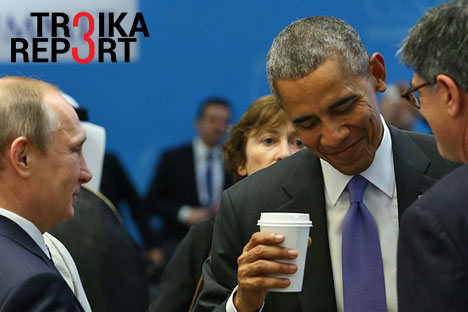
U.S. President Barack Obama , right, talks with Russian President Vladimir Putin, left, prior to a session of the G-20 Summit in Antalya, Turkey.
APIt may only be a coincidence, yet the sinister character and the sheer scale of the French tragedy on Nov. 13, which sent shock waves through world capitals, accelerated the pace of the Vienna talks on the Syrian crisis the next day and reinforced the resolve to fight Islamic State (ISIS) among politicians at the G20 summit in the Turkish province of Antalya the day after.
Russian President Vladimir Putin and his U.S. counterpart Barack Obama spoke for around 35 minutes at the summit, marking a watershed of sorts in the tense relations between the two heads of state.
Putin also met leaders with whom he sees eye to eye neither on the Ukrainian crisis (British Prime Minister David Cameron) nor on the fate of Syrian President Bashar al-Assad (Turkish President Recep Erdoğan and Saudi Arabia's King Salman). Most probably, the ISIS attack on France lightened the uneasiness of this interaction.
It came in a startling contrast to the previous G20 summit in Brisbane when Putin left early amid an unfriendly atmosphere following the shooting down of Malaysia Airlines Flight MH17 over eastern Ukraine, widely suspected in the West of being carried out using arms supplied by Russia (former Australian Prime Minister Tony Abbot threatened to “shirt-front” the Russian president after the incident, in which 27 Australian nationals died).
On the eve of the Antalya summit, foreign ministers in Vienna agreed on the timeline for a political settlement in Syria, stipulating that within a target period of six months a “credible, inclusive and non-sectarian governance” must be established, with process for drafting a new constitution set in motion and the ultimate aim being to hold “free and fair elections” within 18 months.
Secretary-General Ban Ki-moon qualified the Vienna advancement as a “rare moment of diplomatic opportunity to end conflict in Syria.” Even the more reserved, for apparent reasons, Al Jazeera commented on the Vienna consensus: “This seems to be a pretty big breakthrough.”
Could it be that the Paris drama has injected a spark into the hitherto almost dead line of communications between Russia and the West? Yury Rogulev, director of the Franklin D. Roosevelt Foundation for United States Studies at Moscow State University, talked to Troika Report about the intricacies of diplomatic compromises.
“When the tragedy happened, with one of the major allies of the United States in Europe being targeted, it changed the overall situation. The Vienna meeting of foreign ministers showed that it is possible to reach an agreement on Syria. The terrorists’ attacks in Paris demonstrated that there is a common agenda.
“The previous anti-terrorist campaign led by the U.S. and its allies against Islamic militants in Iraq and Syria did not bear fruit: It did not diminish their capabilities to strike Westerners on their own territory. This is a threat not only for Russia, Syria or Turkey but it concerns Europe in general and the United States as well.”
In the aftermath of the Putin-Obama meeting, the G20 came up with a harsh statement highlighting the consent of all the 20 nations to fight ISIS. However, the Kremlin later pointed out that while the strategy is subject to misinterpretation there is a divergence of views on tactics to be applied. Could you decipher this for us?
“The strategic goal is to defeat terrorism. You cannot do it separately, especially not in the Middle East where everybody is fighting everybody and too many state actors are involved in hostilities. Unity is the key to success, as long as there is consensus on the final goal. Notably, President Obama said he supports Russia’s efforts to fight terrorism in Syria. Now it is necessary to define and agree on the format of coordinated both military and political actions.”
The G20 has prioritized combat against ISIS and terrorism in general. This came on in the wake of the positive outcome of the Vienna talks held the day before. Judging by the decisions taken in Vienna and at the G20 summit, are we witnessing a certain alignment of approaches by Russia and the United States in handling the crisis in and around Syria?
“The Russian position from the beginning was that, firstly, the fate of Assad should be decided not in Moscow or in Washington but by the people of Syria. And secondly, someone must fight the terrorist on the ground; it is impossible to defeat ISIS by airstrikes. Once victory is achieved, at least in key areas, then it would be the right moment to let the people of Syria decide on the form of governance they prefer.”
While a divergence of views on the future employment, self-employment, dismissal and oblivion of Bashar al-Assad persists, as well as differences on whether to announce and observe a truce between government forces and the opposition, the 19 concerned international actors, including the United Nations, are slowly but surely pushing ahead the agenda of a political settlement of the internal strife in Syria.
With the Paris drama and its repercussions for the nation’s psyche on everybody’s mind, the double consensus achieved in Vienna and Antalya can hardly be dismissed as insignificant.
The opinion of the writer may not necessarily reflect the position of RBTH or its staff
All rights reserved by Rossiyskaya Gazeta.
Subscribe
to our newsletter!
Get the week's best stories straight to your inbox